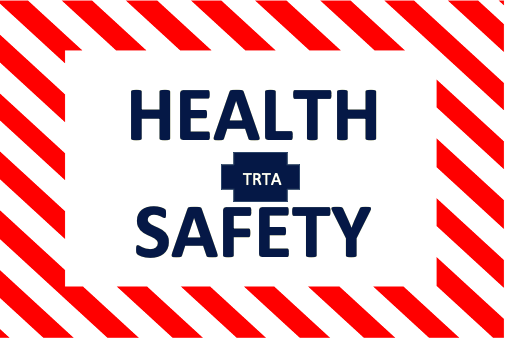Health and Safety Special Committee
2023-2024
State Health and Safety Committee Chair
Ron Leiman
State Health and Safety Committee Members
Mary Ann Dolezal, Judy Hart, Verna Mitchell, (Advisor: Pamela Elza)
The TRTA Health and Safety Special Committee was created by President Marcy Cann and approved by the TRTA Executive Board for 2022-24. This committee will provide some of the information and resources previously promoted by the Healthy Living and Informative and Protective Services State Committees. It is an “opt-in” Committee at the district and local chapter levels.
Districts or local chapters can have a Health and Safety Chair, a Health Chair, a Safety Chair, or none.
The purpose of this special committee is to serve the entire membership of TRTA with health and safety information.
The goals of this committee are to provide monthly health and safety articles; and to promote health and safety programs and special events.
On the first Tuesday of the month, a health article will be posted on the TRTA website. On the third Tuesday of the month, a safety article will be posted on the TRTA website. These articles will include pertinent information for our members and will often include resources and online references. Once an article is replaced, it will become available under the appropriate menu tab. Please see the tabs below. This information is provided for all TRTA members.
Additional information will be provided, primarily for districts and local chapters, including newsletters, a monthly observances planning calendar, program ideas, and special events. Special events will include planning information for health and safety fairs, fitness walks, and other large-scale programs.
In addition to the committee members, advisors will serve in specific roles to assist the committee.
Marcy Cann, TRTA President, oversees this committee.
Roy Varney, TRTA Multimedia Specialist, is the TRTA Staff Liaison.


Safe Gardening
More than 100 million people in America refer to themselves as gardeners. Of these millions, many are susceptible to injuries or illnesses connected to gardening. Gardening may seem to be a safe hobby, and for the most part, it is. ERs treat more than 400,000 injuries each year related to outdoor garden tools or awkward movement.
Some things to remember are:
- Check the Ground Below
Before starting your gardening , it is a good idea to know where you’re digging. The ground beneath you may not be safe. There may be utility lines below the surface of your yard.
- Wear Gloves
Garden gloves are one of the best ways to protect yourself when gardening. Gloves with a rubber coating will help you avoid burns from fertilizer or pesticides and scrapes from sharp objects. They can also protect you from fungi, bacteria and poisonous plants. Gloves can also protect you from tetanus.
- Perform Warm-Up Exercises
It is good to do some warm-up exercises before spending time in your garden. Gardening can affect your body in the same way that a moderate-intensity workout can. In addition to providing vegetables and beautiful flowers, gardening provides health benefits, especially for older adults. These benefits may include lower blood pressure, exercise, memory care, motor skills, social benefit, stress relief and improved immune system.
- Avoid Repetitive Movements
Prolonged and repetitive movements, like digging, raking, trimming, pruning, and planting may strain your muscles. Switch your activities every 15minutes and take breaks. Changing your tasks will allow you to work different muscle groups.
- Banish Back Bending
When performing any activity, it important to protect your back. Not doing so could case muscle spasms or a more serious injury. Kneeling instead of bending will put less strain on your back. For extra comfort, consider wearing a kneepad.
- Check Your Lifting
Lifting heavy objects can cause strain on your back. When lifting heavy objects use your legs and knees and not your back.
- Block the Sun
Whether its hot or cold, the sun’s powerful rays can burn your skin. Experts advise you to apply sunscreen that provides an SPF of a least 15. Wearing a hat is wise.
- Watch Out for Pests
While gardening, look out for pests that could harm you. Be careful of ticks, wasps, mosquitoes, snakes, fire ants and fleas. After a day of gardening, check your clothes and body for insects.
- Protect Your Eyes and Airway
Although working in your garden may not cause an asthma attack allergies to flare up, there may be things in your garden that can get in your eyes and nose. For protection, wear a surgical face mask.
- Stay Hydrated
Sometimes your body may experience dehydration before you start to feel thirsty. Be sure to keep water near you in the garden.
- Tool Safety
Lock garden tools away in a secure area and never leave electrical equipment plugged in when not in use. Keep chemicals like weed killer and fertilizer out of the reach of small children, and always keep them in their original container.
Stress and Older Adults
Stress can be defined as a state of worry or mental tension. Stress is a natural human response that prompts us to address challenges and threats in our lives. Everyone experiences stress to some degree. However, the effects of stress on older adults can be greater than in different age groups. .The unique relationship between stress and aging an cause new health problems and worsen existing ones. Stress even speeds up the aging process. Restated, stress is a feeling of emotional or physical tension. It can come from any event or thought that makes you feel frustrated, angry, or nervous. Stress is our body’s reaction to a challenge or demand. Different situations or life events can cause stress. It is often triggered when we experience something new or unexpected that threatens our sense of self or when we feel we have little control over a situation. We deal with stress in different ways.
There is good stress and bad stress. Stress helps us meet our daily challenges and motivates us to reach a goal, that makes us smarter, happier, and healthier. Good stress is vital for a healthy life. Good stress is short term. Bad stress can be short term (acute) or long term (chronic). Acute stress doesn’t take a heavy toll on your body if you can find ways to relax quickly. However, chronic stress, when you repeatedly face stressors, can take a heavy toll on ones body and can cause negative health effects. Chronic stress can cause headaches, insomnia, weight gain, anxiety, pain and high blood pressure. Both good and bad stress cause your body to release hormones like adrenaline and cortisol. Our reactions to stress determines whether it is good or bad.
Stress negatively impacts the body’s ability to effectively respond to certain kinds of inflammation that lead to age-related conditions. More stress equals more inflammation, and more inflammation when you’re stressed equals more health problems. These may include hardening of the arteries, Type 2 diabetes, dementia, and cancer, to name a few. Chronic stress can also reduce the effectiveness of certain vaccines in older adults.
Stress becomes a problem when it interferes your daily life. To reduce stress, identify good stress from bad stress. As long as it’s not chronic, stress can be a positive addition to your life. Make an effort to reduce your chronic stress as much as possible, and add positive activities to promote good stress it creates a healthy balance and a better quality of life.
| TRTA Health and Safety Special Committee | Effective Date: September 9, 2022 | |
|---|---|---|
| Observances | Month and Week | |
| Month | Health | Safety |
| January | Glaucoma | Winter Safety |
| Cervical Cancer | Radon Action | |
| Birth Defects | Slavery and Human Trafficking | |
| Thyroid | Stalking | |
| Folic Acid Week | ||
| February | Heart Health | Earthquake |
| Girls and Women in Sports | Teen Dating and Violence Prevention | |
| Cancer Prevention | Burn Week | |
| Mascular Degeneration and Low Vision | ||
| Eating Disorder Week | ||
| Sepsis Survival Week | ||
| March | Kidney Disease | Ladder Safety |
| Nutrition | Spring and Flood Safety | |
| Colectal Cancer | Workplace Eye Safety | |
| Tuberculosis | Poison Prevention Week | |
| Brain Injury | Tsunami Week | |
| Multiple Sclerosis | ||
| April | Autism | Alcohol Awareness |
| Sexually Transmitted Diseases | Financial Capability | |
| Irritable Bowel Syndrome | Youth Sports Safety | |
| Stress | Sexual Assault Prevention | |
| Minority Health | Child Abuse Prevention | |
| Parkinson’s Disease | Occupational Therapy | |
| Testicular Cancr | Window Safety Week | |
| Infertilty Week | Playground safety Week | |
| May | Older Americans | Electrical Safety |
| Mental Health | Better Hearing and Speech | |
| Women’s Health | Clean Air | |
| Better Hearing and Speech | Wildfire | |
| Arthritis | Building safety | |
| Lupus | Motorcycle Safety | |
| Asthma and Allergy | Trauma | |
| Osteoporosis | Water Safety | |
| Physical Fitness and Sports | Healthy Vision | |
| Stroke | EMS Week | |
| Nurses Week | ||
| June | Alzheimer’s Disease and Brain Health | National Safety Month |
| Men’s Health | Hydration | |
| Cataract | Pet Preparedness | |
| Migraine and Headache | Summer and Extreme Heat | |
| PTSD | Lightning Week | |
| Scoliosis | Trailer Safety Week | |
| July | Hepatitus | Sunburn |
| Youth Sports | Vehicle Theft Protection | |
| Cleft and Crainiofacial | Fireworks | |
| Group B Stress | ||
| August | Children’s Eye Health and Safety | Water Quality |
| Breastfeeding | Back To School | |
| Immunization | Stop on Red Week | |
| Psoriasis | ||
| September | Healthy Aging | Suicide Prevention |
| Food Safety and Education | Pain | |
| Blood cancer | Fall Safety | |
| Childhood Obesity | Sport Eye Safety | |
| Yoga | Farm Safety and Health Week | |
| Ovarian Cancer | ||
| Prostrate Cancer | ||
| October | Health Literacy | Cybersecurity Awareness |
| Breast Cancer | Fire Prevention | |
| ADHD | Substance Abuse Prevention | |
| Dental Hygiene | Domestic Violence | |
| Down Syndrome | Crime Prevention | |
| School Bus Safety Week | ||
| November | Diabetes | Family Caregivers |
| Lung Cancer | Hospice and Palliative Care | |
| Chronic Obstructive Pulmonary Disease | Holiday Cooking Safety | |
| Alzheimer’s Disease | Holiday Online Shopping | |
| Pancreatic Cancer | ||
| December | Flu Vaccine | Frostbite |
| HIV/Aids Awareness | Impaired Driving Prevention | |
| Holiday Fire Safety | ||
| Sources | health.gov | www.ready.gov/calendar |
| Centers for Disease Control and Prevention | National Safety Council | |
| https://dphhs.mt |
